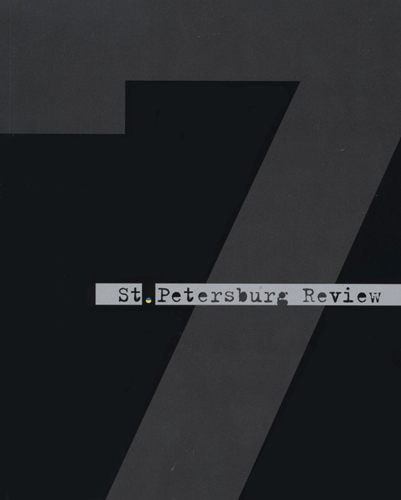St. Petersburg Review – 2014
In 1981, I spent two weeks in the former Soviet Union. Every city was a highlight, but the most breathtaking destination was Peter the Great’s summer palace in St. Petersburg, Russia. The garden fountains were fun, yet I found the dazzlingly golden statues most extraordinary. Those recollections piqued my interest in reading an issue of St. Petersburg Review. In 1981, I spent two weeks in the former Soviet Union. Every city was a highlight, but the most breathtaking destination was Peter the Great’s summer palace in St. Petersburg, Russia. The garden fountains were fun, yet I found the dazzlingly golden statues most extraordinary. Those recollections piqued my interest in reading an issue of St. Petersburg Review.
The magazine contains the usual categories of poetry, fiction, and fact, but there is a difference. Half are translated, many from Slavic languages, by a team of 18 who hail from all over the world.
The tone of the writing is often surprising, sometimes shocking, and still entertaining. Midway through the magazine, I was becoming suspicious that something untoward was about to happen in every piece I read. For example, Lida Yusupova’s poem “the scar of which we’ve known from the very start,” translated by Joyce Lim, begins this way:
on the New York subway opposite us sat a black man with a pink scar across
his neck
he was listening to the voices
I know about the voices because Dima had exactly the same scar
after he tried to cut his head off
Igor Lapinsky’s poem, translated from Russian by Alex Cigale, is titled “I Am a Separatist.” Lapinsky expresses these thoughts: “Wearing balaclavas, fused into their skin, with AK automatics grafted onto / their hands, / They burst into our pit, these nameless ones.” So the magazine is a mix of ill-fated situations and those of a more hopeful nature.
In the fiction category, poet and painter Jill Hoffman writes one of the two former-boyfriend stories featured in this issue. Hoffman’s is “Heathcliff.” Much of her story focuses on a grandmother and her ex trying to outdo each other with tales of their medical histories, but then we witness the consequences of not hanging up the phone properly.
While Hoffman’s narrator mostly is amusing, Chilean writer Claudia Apablaza, translated by Toshiya Kamei, is bitter about her affair with a Spanish tourist in “I Think I Made You Up Inside My Head.” Offering variety in this variance, the central character searches out the house where famous writers were supposed to have stayed:
The point is that I came here to find the place where Sylvia Plath and Ted Hughes honeymooned, but I can’t find it. I came to ‘Tourist Land’ to forget my desperate affair, the abandonment that followed it. I came here to kill him completely, to kill the lover who denied me the so-called heaven he was telling me about.
Continuing with variety in this issue, other fiction pieces include “The Left Ear” by Ma Xiaoli, translated by Chu Dongwei, which could be subtitled “Head in a Box,” and a two-page story, “Francesca and Gerard,” by Laurie Stone that might be described as a naughty Aesop’s Fable minus the animals. Jennifer Natalya Fink, in her story “from Concordance,” names the toilet in her prison cell Jerome.
The only nonfiction in this issue is “Father Futures: A Pop Song” by Jeffery Renard Allen, who’s on the fence about finding his biological father. Allen has a poem in this issue, too, with the exceedingly long title, “Woods Hole: Biologist Ernest Everett Gazing Out from Penzance Point at the Cape.” I actually prefer his poem, wrought with strong imagery, which begins:
The angels have hung out their robes
and dew from heaven has fallen on them
in a thousand glittering beads
Another poem that sticks with me is Mary Rozmus-West’s “At the Gap on Beechen Cliff,” in which she draws a successful analogy between war and cutting down a forest:
For hours on the third day the grinder
whined and clattered and, as in other
times and places, we hid inside/behind the curtains while our neighbours
were led away.
This poem rightfully won the magazine’s 2013 poetry contest.
Well, I found nothing in this issue about Peter the Great’s summer palace. Instead, I found an exciting mind travel, courtesy of writers who live in more places I could visit. St. Petersburg Review is an insightful magazine that will bring you closer to the human interactions of our global neighbors. It’s an absorbing read.
[www.stpetersburgreview.com]





